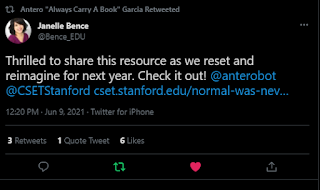Twitter Collaboration
I love this bird app...
Over the past couple of years I have received better professional development (PD) on Twitter than in many spaces. In my recent studies on PD, I have found that teachers learning from other teachers in a participatory environment in ways that confirm identity while being at the intersection of teachable moments are just a few of the great ideas coming from my readings (Flint, Zisook, Fisher, 2011; Hardin & Koppenhaver, 2016). Twitter can even be seen as a great example of Student-Directed Learning (SDL) and Adult Learning Theory (Zemke & Zemke, 2007). Prestridge (2017) compares and contrasts social networking sites (SNS) and Learning Management Systems (LMS) that are utilized by schools. In a moment of distraction from the work I was supposed to be doing, I hopped on Twitter last night at 11 PM (don't ask what I was doing working so late), and I started to poke around.
I noticed that my research journey and action started about a year ago when I started to really pay attention to the names appearing in the citations while reading in my master's program. Dr. Antero Garcia was a name I was repeatedly seeing. I had heard his name before with great praise coming from folx at the Georgia Council Teachers of English (GCTE), an affiliate of the National Council Teachers of English (NCTE), so I had enough knowledge that I wanted to check out what he had to say whenever I did see his name. From research about writing letters to the future president of the United States as work with identity and reflection to his research about affirming cellphones in the classroom, I was enthralled. So when I went to write a chapter for a book last year, I reached out to him on Twitter and asked if we could talk about some research I was doing related to the academic spaces he moves in. That's when I discovered that he is also incredibly kind.
During a pandemic, Dr. Garcia set up a Zoom interview with me to ask him questions about his research and talk through some of my ideas about my topic: Decriminalizing Cellphones - Before and After the Pandemic. He has published several studies on this topic and even wrote a book about it. His willingness to meet with an amateur scholar who he had never met was really inspiring and telling of how he sees himself in scholarship: a changemaker. We both take an emancipatory stance on policing student behavior in which cellphones play a larger role. This is just another way that teachers police students. Technology, like many things, is something that teachers try to control in their spaces. But that isn't what this post is about. The point is, when Dr. Garcia writes something, I try to read it. So going back to me, sitting at my computer at 11 PM and working on an analysis of a research study for class and desperately looking for a distraction...I saw this:
Janelle Bence worked with Dr. Garcia on the above work. I retweeted this, and very quickly Janelle Bence and I were exchanging Tweets about some inspiring ideas:
and then...
What am I really doing in my classroom? What's the purpose of student learning?
If it's not to create change or create a more democratic society, what's the point? The difference between students reading books and advocacy work is vast. Bottom line - I've got some new reading to do. I hope that I can work with Janelle Bence this upcoming year. I hope that our students can work together to gain new understandings and work on advocacy in communities and spaces that are important to them. This is what youth participatory action research is...right?
I've never been so excited to be so overwhelmed and lost.
Flint, A.S., Zisook, K., Fisher, T. (2011). Not a one-shot deal: Generative professional development among experienced teachers. Teaching and Teacher Education. 27(8), 1163-69. https://doi.org/10.1016/j.tate.2011.05.009
Hardin, B. & Koppenhaver, D. (2016). Flipped professional development: An innovation in response to teacher insights. Journal of Adolescent & Adult Literacy, 60(1), 45-54. https://doi.org/10.1002/jaal.522
Prestridge, S. (2017). Conceptualising self-generating online teacher professional development. Technology, Pedagogy and Education, (26), 85-104. DOI:10.1080/1475939X.2016.1167113
Zemke, R., & Zemke, S. (2007). Innovation Abstracts. In S. D. Roueche (Ed.), 30 Things we know for sure about adult learning (Vol. XXIX). Austin, TX: National Institute for Staff and Organizational Development, College of Education, The University of Texas at Austin.






Comments
Post a Comment